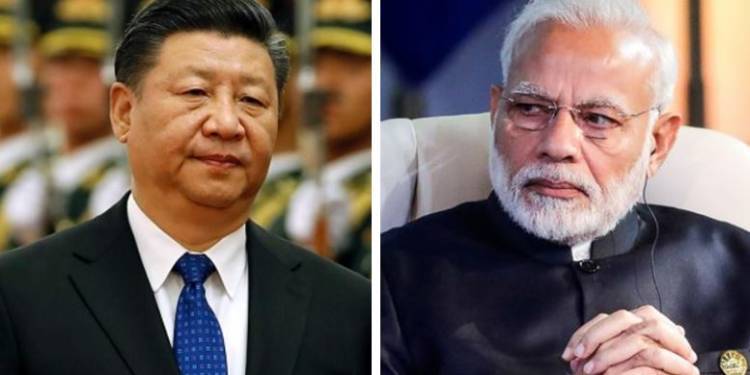India and China have been involved in a border standoff for some six months now and with winter picking pace in the northern part of India near the LAC, the timid Chinese PLA troops are staring at a long winter with frigid temperatures that could even freeze the marrow of bones. While the border standoff continues, China has unabashedly turned to India to feed its population which is demanding rice to eat. It is imperative to note that India is the world’s biggest exporter of rice whereas China is the biggest importer.
According to an Indian Express report, China has started importing Indian rice after a gap of two years and placed orders for shipment of about 5,000 tonnes of non-basmati rice. In 2006, China was given market access for Indian rice but shipments took place only during 2017-18 fiscal. Indian traders have contracted to export 100,000 tonnes of broken rice for Dec-February shipments at around $300 per tonne, industry officials said. The broken rice is used for making noodles as well as for its use in the wine industry.
“For the first time, China has made rice purchases. They may increase buying next year after seeing the quality of Indian crop,” said B V Krishna Rao, president of the Rice Exporters Association.
In 2019-20 fiscal, total basmati rice exports were at a record 4 million tonnes and non-basmati rice at 5 million tonnes. Whereas, as per the All India Rice Exporters Association (AIREA) data– India has so far exported 2.8 million tonnes of basmati rice and 6.1 million tonnes of non-basmati rice during the April-October period of the current fiscal.
The Indian government is allowing the export of rice amid the Himalayan standoff but Beijing should be wary that if it riles up India, and in an off chance, starts a war, it could be starved to death if India chooses to do so. History has shown that the most naïve of enemies can be forced to lie prostrate if their population is forced to starve.
During World War 1, the Allies countries together had launched a prolonged Operation named ‘Blockade of Germany’ under which the Allies navies cut off Germany from the receiving food imports of any kind from the exporting countries.
The Operation ‘Blockade of Germany’ is considered one of the key elements that eventually led to an all-out allied victory in World War 1. The German Board of Public Health in December 1918 claimed that 763,000 German civilians died from starvation and disease caused by the blockade up until the end of December 1918. An academic study done in 1928 put the death toll at 424,000. An additional 100,000 people may have died during the continuation blockade in 1919.
Britain with its powerful Navy was the chief orchestrator behind the entire rendezvous and Winston Churchill himself has shed light on the ‘idea of starving’ common German people to win the war.
“The British blockade treated the whole of Germany as if it were a beleaguered fortress, and avowedly sought to starve the whole population – men, women and children, old and young, wounded and sound – into submission.” Churchill had stated.
It is highly unlikely that India would chart a course, similar to that of Winston Churchill but if the push comes to shove, India certainly would have a trick up its sleeve. And if China thought it could rely on ASEAN countries to bail out then it is sadly mistaken. China’s traditional suppliers, such as Thailand, Vietnam, Myanmar, and Pakistan, have limited surplus supplies for export and at any instant quote prices which are at least $30 per tonne more compared with Indian prices.
In case of any war, these prices will go up significantly as countries like Thailand and Vietnam look to maximize the profits and use the War to their benefit. Thus, a tyrannical leader like Xi Jinping, who’d rather spend his bucks on military equipment would even leave his population to fend for themselves.
Reported earlier by TFI, Xi Jinping is already telling his countrymen to ‘eat less’ and therefore has launched the ‘Clean Plates Campaign’ to curb the leftovers problem. These are ominous signs as China heads towards a major famine situation, possibly triggered by Xi Jinping’s hara-kiri decisions in the first place. Having already depleted the aquatic ecosystem around the country, it should be a matter of time that the agrarian structure of China falls under its own weight—if Xi Jinping continues to tread the path of antagonizing countries that supply the ‘life-enduring’ food to it.
Read more: The voracious appetite of the Chinese for fish is turning oceans and seas across the world fish-less
Xi Jinping’s campaign has an uncanny similarity with Venezuelan President Nicholas Maduro’s Plan Conejo or ‘Plan Rabbit’, wherein the Communist leader plans to fight the country’s hunger problem. Venezuela, once the most prosperous of Latin American countries, has been rendered impoverished under the reign of two consecutive radical socialists- Hugo Chavez and Maduro, so much so that Venezuelans are forced to eat rabbits for survival.
China should, therefore, be wary of striking the hornet’s nest that is India and respectfully continue to receive the food products, until New Delhi allows it so and if possible stop with its nefarious tactics along the border, for the downside of enraging India outweigh the benefits.
